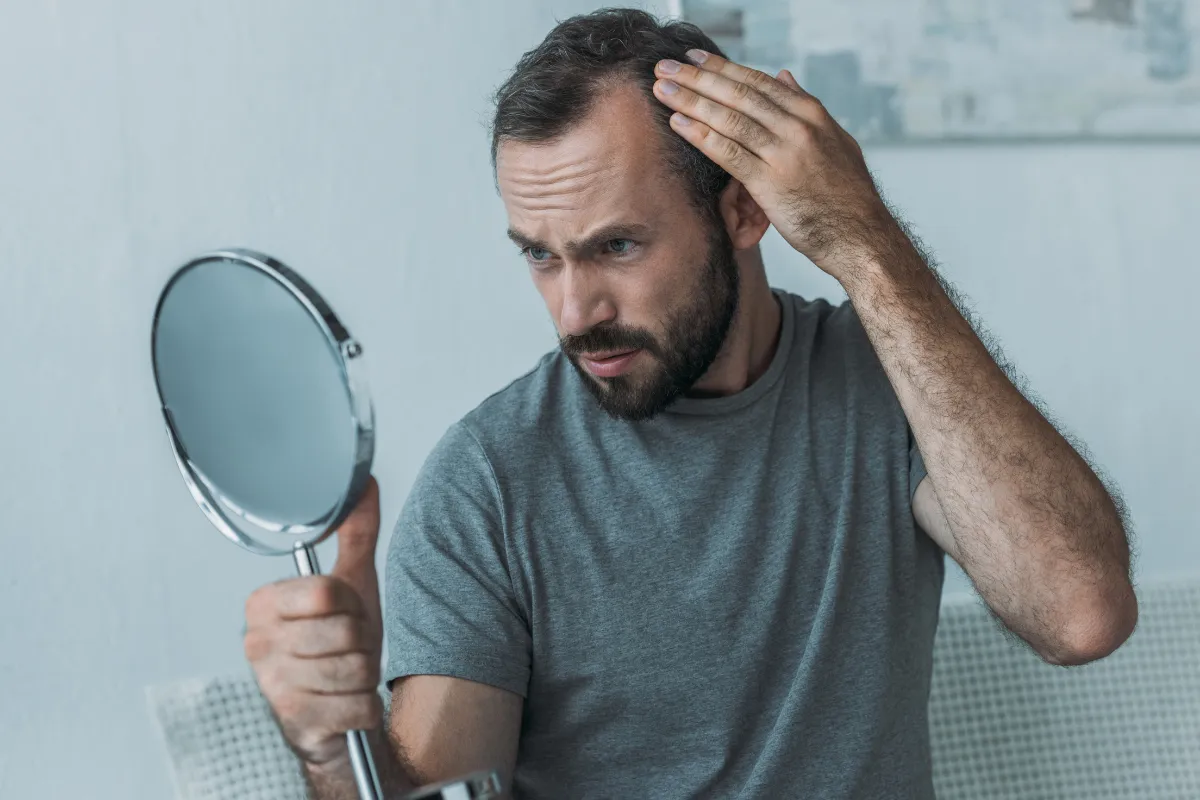
Can Parkinson’s Patients Undergo Hair Transplantation?
Yes, some people with Parkinson’s disease can safely undergo a hair transplant, especially in early or well-controlled stages. The key is planning around tremors, medication timing, blood-pressure fluctuations, and aftercare support. A hair-transplant team should coordinate with the patient’s neurologist to reduce risk and keep Parkinson’s medicines on schedule.

Table of Contents
What Parkinson’s Disease Means For Surgery
Parkinson’s disease (PD) is a progressive neurological condition that can cause tremor, stiffness, slowed movement, balance changes, sleep problems, and sometimes cognitive or mood symptoms.
Hair transplantation is usually performed under local anesthesia, often with long procedure times and strict “stay still” requirements. That combination is workable for many patients, but it calls for extra preparation in PD.
Is A Hair Transplant Safe For Parkinson’s Patients?
In general, PD is not an automatic “no.” Candidacy depends less on the diagnosis itself and more on how stable symptoms are, how predictable medication response is, and whether the patient can tolerate several hours in one position.
Most clinics will ask for medical clearance when PD is moderate to advanced, when there is significant tremor, or when there are cardiovascular or respiratory concerns.

Key Factors That Decide Candidacy
Tremors And The Ability To Stay Still
Hair transplantation requires precision while grafts are harvested and implanted. Involuntary head movement can reduce accuracy and may increase graft trauma.
Patients with mild, well-controlled tremor often do fine, especially if the clinic uses supportive positioning, breaks, and a calm environment. For more pronounced tremor, a surgeon may recommend shorter sessions on different days or postponing until symptoms are better controlled.
Medication Schedule And Drug Interactions
A common perioperative principle in PD is to keep dopaminergic medication as close to the usual schedule as possible. Missed or delayed doses can trigger a “wearing-off” period with worse rigidity, tremor, anxiety, or difficulty moving.
Let the clinic know every PD medication you take, including levodopa/carbidopa, dopamine agonists, MAO-B inhibitors, and COMT inhibitors. Some combinations can affect blood pressure or interact with drugs used around procedures, so coordination with the neurologist (and the anesthesia team if sedation is planned) matters.
Local anesthetic often contains epinephrine (adrenaline) to reduce bleeding. In people taking a COMT inhibitor, there are reports of significant blood-pressure elevation with epinephrine-containing local anesthetic in dental-type procedures. This does not mean it is always unsafe, but it is a reason to individualize the anesthetic plan and monitor blood pressure carefully.
Autonomic Symptoms And Blood-Pressure Fluctuations
Many people with PD experience autonomic issues such as orthostatic hypotension (a blood-pressure drop when standing), constipation, urinary symptoms, and temperature regulation problems.
Even with a hair transplant done under local anesthesia, long time on the table, stress, and pain can affect heart rate and blood pressure. If you have known orthostatic hypotension, supine hypertension, or fainting episodes, your team may adjust fluids, positioning, and monitoring.
Swallowing, Reflux, And Aspiration Risk
Swallowing changes and reflux can be part of PD. If sedation is used, airway protection and aspiration risk become more relevant.
Tell your clinic if you have choking episodes, frequent coughing with liquids, uncontrolled reflux, or a history of pneumonia. This helps the team decide whether to avoid sedation, limit it, or involve an anesthesia professional.
Cognition, Anxiety, And Comfort During Long Sessions
A hair transplant can take several hours, and boredom, anxiety, pain sensitivity, or “off” periods can make it harder to complete comfortably.
If you have significant anxiety, claustrophobia, impulsive movements, or cognitive changes, discuss this early. A plan with more breaks, shorter sessions, and a caregiver present on the day can make a real difference.
Aftercare Support
Early aftercare requires gentle cleansing, sleeping position precautions, and avoiding rubbing or scratching the grafts.
If hand tremor or stiffness makes precise aftercare difficult, plan for help during the first 7–10 days. A caregiver can assist with washing, medication timing, and keeping the scalp protected.
Pre-Procedure Checklist For Parkinson’s Patients
- Get a neurologist review if symptoms have changed in the last 3–6 months, if you have frequent “off” periods, or if medication adjustments are ongoing.
- Ask the clinic for a written plan for PD medication timing on procedure day, including what to do if fasting is required and how soon you can resume doses after the session.
- Share your full medication list, including COMT inhibitors and MAO-B inhibitors, plus any blood-pressure medications and blood thinners.
- Discuss tremor control and positioning. If you struggle to stay still, ask about splitting the procedure into shorter sessions.
- Flag autonomic symptoms: dizziness on standing, fainting, unpredictable blood pressure, constipation requiring medication, urinary urgency, or heat intolerance.
- Arrange aftercare help for at least the first week if motor symptoms are moderate or if you live alone.
- Plan transport. Driving right after a long session is a bad idea for most patients, and it may be unsafe if tremor or fatigue is significant.
What To Expect On The Day Of The Procedure
Many patients do best with a morning appointment. This reduces the chance that medication schedules drift and helps avoid prolonged time without dopaminergic therapy.
Expect frequent blood-pressure checks, especially if you have autonomic symptoms. If the anesthetic contains epinephrine, monitoring becomes even more important.
Ask for short standing or stretching breaks when safe to do so. Small comfort steps reduce the chance of restlessness or involuntary movements later in the session.
When It’s Better To Postpone Or Avoid Surgery
A hair transplant is elective. If the risk picture is unfavorable, postponing is often the smartest choice.
Consider delaying if tremors are severe and unpredictable, if you cannot remain still even with breaks, if blood pressure is unstable, or if cognitive symptoms make informed consent and aftercare unreliable.
Active scalp disease (dermatitis, infection), uncontrolled diabetes, or use of certain blood thinners may also require postponement until optimized.
Non-Surgical Alternatives That Can Still Help
If surgery is not a good fit right now, you still have options that can improve appearance without long procedure times.
Camouflage products (hair fibers, concealers) can create instant density. Medical treatments for pattern hair loss, such as topical minoxidil or oral options prescribed by a clinician, may slow progression and thicken existing hair for some patients.
Some clinics also offer PRP as an adjunct for certain types of thinning, though results vary and it is not a replacement for a transplant when coverage is limited.
FAQs
What is the most common cause of death in Parkinson’s patients?
Aspiration pneumonia is the most common cause of death in Parkinson’s patients.
Does Parkinson’s affect hair loss?
Yes—dopaminergic Parkinson’s medications can cause hair loss; Parkinson itself isn’t a direct cause.
What benefits can I claim if I have Parkinson’s?
Disability, mobility, and caregiver-support benefits may be available under local eligibility rules.
What is the life expectancy of a person with Parkinson’s disease?
Median survival is about 10–15 years after diagnosis; many people live longer.
What is the 5:2:1 rule for Parkinson’s?
5:2:1 means ≥5 levodopa doses/day, ≥2 hours OFF/day, ≥1 hour dyskinesia/day.




